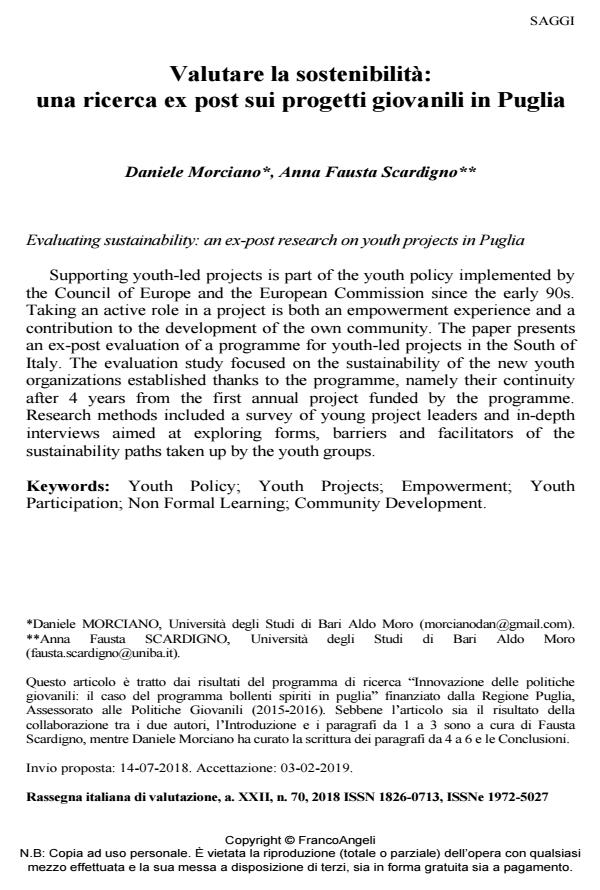Evaluating sustainability: an ex-post research on youth projects in Puglia
Journal title RIV Rassegna Italiana di Valutazione
Author/s Daniele Morciano, Anna Fausta Scardigno
Publishing Year 2019 Issue 2018/70 Language Italian
Pages 23 P. 52-74 File size 477 KB
DOI 10.3280/RIV2018-070004
DOI is like a bar code for intellectual property: to have more infomation
click here
Below, you can see the article first page
If you want to buy this article in PDF format, you can do it, following the instructions to buy download credits

FrancoAngeli is member of Publishers International Linking Association, Inc (PILA), a not-for-profit association which run the CrossRef service enabling links to and from online scholarly content.
Supporting youth-led projects is part of the youth policy implemented by the Council of Europe and the European Commission since the early 90s. Taking an active role in a project is both an empowerment experience and a contribution to the development of the own community. The paper presents an ex-post evaluation of a programme for youth-led projects in the South of Italy. The evaluation study focused on the sustainability of the new youth organizations established thanks to the programme, namely their continuity after 4 years from the first annual project funded by the programme. Research methods included a survey of young project leaders and in-depth interviews aimed at exploring forms, barriers and facilitators of the sustainability paths taken up by the youth groups.
Keywords: Youth Policy; Youth Projects; Empowerment; Youth Participation; Non Formal Learning; Community Development.
- Cameron C., Moss P. (eds.) (2011), Social pedagogy and working with children and young people. Where care and education meet, Jessica Kingsley Publishers, London-Philadelphia.
- Campbell C. (2009), Distinguishing the Power of Agency from agentic power: a note on Weber and the ‘black box’ of personal agency, Sociological Theory, 27, 4, pp. 405-418.
- Chell E., Athayde R. (2009), The identification and measurement of innovative characteristics of young people. Development of the Youth Innovation Skills Measurement Tool, NESTA, London. Colombo M. (2011), Educational choices in action: young Italians as reflexive agents and the role of significant adults, Italian Journal of Sociology of Education, 3, 1, pp. 14-48.
- Council of Europe (2003), Revised European Charter on the Participation of Young People in Local and Regional Life, 21 May 2003.
- Donati P. (2006), L’approccio relazionale al capitale sociale, Sociologia e politiche sociali, 10, 1, pp. 9-39.
- Ellerman, D. (2006), Helping People Help Themselves, The University of Michigan Press
- Eshach H. (2007), Bridging In-school and Out-of-school Learning: Formal, Non-Formal, and Informal Education, Journal of Science Education and Technology, 16, 2, pp. 171-190.
- European Commission (2009), An EU Strategy for Youth – Investing and Empowering. A renewed open method of coordination to address youth challenges and opportunities, COM(2009) 200
- Funnell S.C., Rogers P.J. (2011), Purposeful program theory. Effective use of theories of change and logic models, Jossey-Bass, San Francisco, CA.
- Hart R.A. (1992). Children’s participation: From tokenism to citizenship. Firenze: UNICEF ICDC Hitlin S., Elder G.H. Jr. (2007), Agency: an empirical model of an abstract concept, Advances in Life Course Research, 11, pp. 33-67.
- Kirton, M. (1976). Adaptors and innovators: A description and measure. Journal of Applied Psychology, 61(5): 622-629.
- Lerner J.V., Phelps E., Forman Y., Bowers E.P. (2009), Positive Youth Development, in Lerner R.M., Steinberg L. (eds.), Handbook of Adolescent Psychology, Vol. 1: Individual Bases of Adolescent Development, John Wiley & Sons, Hoboken, NJ, pp. 524-558.
- Magatti M. (2017) Social Generativity: A Relational Paradigm for Social Change, Routledge Mancini J.A. e Marek L.I. (2004), Sustaining Community-Based Programs for Families: Conceptualization and Measurement. Family Relations, 2004, 53: 339-347
- Meldolesi L. (1994). Alla scoperta del possibile. Il mondo sorprendente di Albert Hirschman. Bologna: Il Mulino
- Minervini G. (2016). La politica generativa. Pratiche di comunità nel laboratorio Puglia. Roma: Carocci
- Morciano D. & Merico M. (2017) Critical youth work for youth-driven innovation: a theoretical framework. In Bastien S. & Holmarsdottir H.B. (eds). Youth as Architects of Social Change. Global Efforts to Advance Youth-Driven Innovation. Plagrave Macmillan.
- Morciano D. (2015). Spazi per essere giovani. Una ricerca sulle politiche di youth work tra Italia e Inghilterra. Milano: FrancoAngeli.
- Moro G. (2004). Lo sviluppo nascosto: fattori sociali e valutazione delle politiche per il Meridione. Roma: Carocci
- Patton M.Q. (1997), Utilization-Focused Evaluation. The New Century Text, SAGE, London.
- Pierro A., Presaghi F., Higgins T.E., Kruglanski A.W. (2009), Regulatory mode preferences for autonomy supporting versus controlling instructional styles, British Journal of Educational Psychology, 79, 4, pp. 599-615.
- Scardigno A.F., Manuti A. (2011). Giovani che partecipano. Una ricerca sulle politiche giovanili della Regione Puglia. Roma: Aracne.
- Sebba J., Griffiths V., Luckock B., Hunt F., Robinson C., Flowers J. (2009), Youth-led innovation: enhancing the skills and capacity of the next generation of innovators, NESTA, London.
- Shier H. (2001). Pathways to Participation: Openings, Opportunities and Obligations. Children and Society, 15: 107-117.
- Vecchiato T. (2014), Il welfare generativo, una sfida politica e sociale. Studi Zancan, 4, pag. 40-44
- Watts C.E., Caldwell L.L. (2008), Self-Determination and Free Time Activity Participation as Predictors of Initiative, Journal of Leisure Research, 40, 1, pp. 156-181.
- Wenger J.L.E. (2006). L' apprendimento situato. Dall'osservazione alla partecipazione attiva nei contesti sociali. Erickson.
- Yin R.K. (2009), Case Study Research. Design and Methods, SAGE, Thousands Oaks, CA.
Daniele Morciano, Anna Fausta Scardigno, Valutare la sostenibilità: una ricerca ex post sui progetti giovanili in Puglia in "RIV Rassegna Italiana di Valutazione" 70/2018, pp 52-74, DOI: 10.3280/RIV2018-070004